|
|
|
Sort Order |
|
|
|
Items / Page
|
|
|
|
|
|
|
| Srl | Item |
| 1 |
ID:
156165


|
|
|
| 2 |
ID:
192457


|
|
|
|
|
| Summary/Abstract |
THE world is gripped by unprecedented interest in artificial intelligence (AI). Articles, books, conferences, and seminars on AI are multiplying exponentially. More importantly, so are AI-based machines, mechanisms, and tools, which are used in practically every industry.
|
|
|
|
|
|
|
|
|
|
|
|
|
|
|
|
| 3 |
ID:
172575
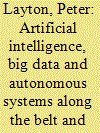

|
|
|
|
|
| Summary/Abstract |
China is pressing ahead with ambitious plans to create a massive infrastructure network connecting it with many countries across the globe. Some of the ‘belt and road’ infrastructure will however, run through regions convulsed by chronic civil unrest, substantial criminality and incipient insurgencies and need protection by China’s private security companies. Simultaneously the Chinese state is undertaking a major ‘anti-secession and counter-terrorism’ campaign in Xinjiang using a variety of high-technology means: artificial intelligence, big data, wireless connectivity, autonomous systems and robotics. The demand and supply sides seem to be in sync, suggesting Chinese private security companies will soon use a suite of advanced information technology systems with a proven employment doctrine across much of Central Asia, South Asia and Africa. Such a future may be plausible but it is by no means certain as various factors may yet thwart China’s private security companies.
|
|
|
|
|
|
|
|
|
|
|
|
|
|
|
|
| 4 |
ID:
162309
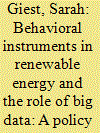

|
|
|
|
|
| Summary/Abstract |
There has been a surge in the application of behavioral insights for environmental policymaking. It is often presented as an easy and low-cost intervention to alter individual behavior. However, there is limited insight into the cost effectiveness of these attempts and the impact of inserting behavioral policy instruments into an existing mix of traditional tools in a particular policy sector. Furthermore, there has been little focus on the intersection of large behavioral datasets and how they could complement behavioral insights. We present a conceptual overview of how the intersection of big data and behavioral knowledge would work in the renewable energy sector. We indicate that inserting behavioral insights into the energy instrument mix is complex due to technological trajectories, path dependencies and resistance from incumbent industries to change production patterns. We also highlight the underutilized role of large behavioral datasets that can inform not only policy implementation, but also policy design and evaluation efforts. Drawing on these findings, we introduce future research streams of government capacity in combining behavioral insights and data, the compatibility of this information with existing policy instruments and how this affects policy change.
|
|
|
|
|
|
|
|
|
|
|
|
|
|
|
|
| 5 |
ID:
157974


|
|
|
|
|
| Summary/Abstract |
This article explores the role big data plays in the national security decision-making process. The global surveillance disclosures initiated by former NSA contractor Edward Snowden have increased public and academic discussions about big data and national security. Yet, efforts to summarize and import insights from the vast and interdisciplinary literature on data analytics have remained rare in the field of security studies. To fill this gap, we explain the core characteristics of big data, provide an overview of the techniques and methods of data analytics, and explore how big data can support the core national security process of intelligence. Big data is not only defined by the volume of data but also by their velocity, variety and issues of veracity. Scientists have developed a number of techniques to extract information from big data and support national security practices. We find that data analytics tools contribute to and influence all the core intelligence functions in the contemporary US national security apparatus. However, these tools cannot replace the central role of humans and their ability to contextualize security threats. The fundamental value of big data lies in humans' ability to understand its power and mitigate its limits.
|
|
|
|
|
|
|
|
|
|
|
|
|
|
|
|
| 6 |
ID:
147943


|
|
|
|
|
| Summary/Abstract |
The claim that big data can revolutionize strategy and governance in the context of international relations is increasingly hard to ignore. Scholars of international political sociology have mainly discussed this development through the themes of security and surveillance. The aim of this paper is to outline a research agenda that can be used to raise a broader set of sociological and practice-oriented questions about the increasing datafication of international relations and politics. First, it proposes a way of conceptualizing big data that is broad enough to open fruitful investigations into the emerging use of big data in these contexts. This conceptualization includes the identification of three moments contained in any big data practice. Second, it suggests a research agenda built around a set of subthemes that each deserve dedicated scrutiny when studying the interplay between big data and international relations along these moments. Through a combination of these moments and subthemes, the paper suggests a roadmap for an international political sociology of data practices.
|
|
|
|
|
|
|
|
|
|
|
|
|
|
|
|
| 7 |
ID:
167491
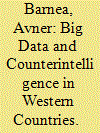

|
|
|
| 8 |
ID:
155736


|
|
|
|
|
| Summary/Abstract |
The incongruity between traditional research standards and the realities of “big data” raises novel ethical questions for political science researchers. Data’s status as a commodity largely held by private companies only further confuses matters. Drawing on Max Weber, this article attempts to shift the current ethical discussion away from the individualistic concern for privacy toward the more collective framework of democratic values.
|
|
|
|
|
|
|
|
|
|
|
|
|
|
|
|
| 9 |
ID:
145244


|
|
|
|
|
| Summary/Abstract |
This article examines the intersection of Big Data and strategic intelligence from a theoretical-conceptual viewpoint. Adopting Popperian refutation as a starting point, it approaches methodological issues surrounding the incorporation of Big Data into the intelligence cycle, and argues that Big Data analytics is best used to discern long-term developments, generate intelligence hypotheses, and adduce refuting facts. The article then briefly examines the use of Big Data via social media, an increasingly fertile platform for intelligence analysis. Finally, the article argues that despite its potential in filling our epistemic gaps, Big Data should continue to complement traditional subject-matter expertise, supported by game theory, as part of a tripartite analytical framework for strategic intelligence consisting of ‘subtext’, ‘context’ and ‘metatext’. In this respect, Big Data may well become the midwife for more open modes of intelligence management and, ultimately, a more open society.
|
|
|
|
|
|
|
|
|
|
|
|
|
|
|
|
| 10 |
ID:
192387


|
|
|
|
|
| Summary/Abstract |
In this work, we systematically investigate the pricing mechanism change from auction to big data pricing on one of the major marketplace lending platforms in China. We find that big data pricing reduces the average interest rate while the borrowers with delinquency or default histories are assigned higher interest rates. However, repeat borrowers are also faced with growing interest rates, even though they have been paying their debts on time. Further analysis shows that repeat borrowers have lower income and education levels. Moreover, investor returns become less dispersed after pricing with big data, which can be a result of homogeneous loans on the market. The implications of the above findings are discussed.
|
|
|
|
|
|
|
|
|
|
|
|
|
|
|
|
| 11 |
ID:
164195
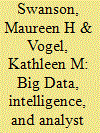

|
|
|
|
|
| Summary/Abstract |
The Laboratory for Analytic Sciences (LAS) at North Carolina State University, funded by the National Security Agency, is a collaborative, long-term research enterprise focused on improving intelligence analysis using Big Data. In its work, LAS has recently begun dealing with the trade-off between the collection, storage, and use of large unclassified data-sets and analyst privacy. We discuss particular privacy challenges at LAS, analyze privacy principles in the life cycle of LAS unclassified data-sets, what intelligence analysts themselves think about these privacy concerns, and recommend possible best practices potentially applicable to LAS, as well as future Big Data laboratories and research centers that collaborate with intelligence communities.
|
|
|
|
|
|
|
|
|
|
|
|
|
|
|
|
| 12 |
ID:
162247


|
|
|
|
|
| Summary/Abstract |
Can textual analysis improve statistical prediction of risky geopolitical events? North Korea is the greatest source of geopolitical risk for South Korea due to the former’s unpredictable and secretive military actions against the latter. We find that the tone of English language news articles published by non-South Korean news media, especially U.K. news media, has significant predictive power about North Korean military aggressions. The inclusion of language tone improves the predictive power of the empirical model by as much as 47%.
|
|
|
|
|
|
|
|
|
|
|
|
|
|
|
|
| 13 |
ID:
161881


|
|
|
|
|
| Summary/Abstract |
We evaluate factors affecting the demand for MOOC by estimating its demand function in OECD countries and in China. We apply a Big Data approach to construct a proxy for MOOC demand using Google Trends for OECD and Baidu Index for China. Based on estimation results of various panel data models, we find that in both cases, higher unemployment promotes MOOC demand. However, in OECD countries, the proportion of individuals with high school level or higher education have positive and significant effects on MOOC demand, while in China, we observe positive and significant effects from internet speed and average income.
|
|
|
|
|
|
|
|
|
|
|
|
|
|
|
|
| 14 |
ID:
155685


|
|
|
|
|
| Summary/Abstract |
The emergence of ‘big data’ and calls for ‘evidence-based decision-making’ to increase the effectiveness of peacekeeping, humanitarian, and development programming have resulted in an often-unadulterated embrace of the promise of data as a solution to a diverse set of problems facing these sectors. At the same time, however, the increasing and widespread collection of data – by researchers, policymakers, and operational actors – directly contrasts with the sense that data are often collected yet not used. Taking a step back, this article examines the epistemologies of data collection and use from the perspectives of the scholar/researcher, and the practitioner/operational actor to illustrate how these perspectives elicit a series of data divergences. I argue that the collection and use of data replicate and are poised to extend the theory-practice divide that exists between researchers who study violence – those working ‘on’ conflict – and the peacekeepers, peacebuilders, and aid workers who work ‘in’ the midst of it. Differing conceptions of the purpose and use, sources and characteristics, and time frames of data reflect role-based positionalities that shape practices of collection, affect their interoperability, and limit their possible use, even as combining these types of data could also address their inherent limitations.
|
|
|
|
|
|
|
|
|
|
|
|
|
|
|
|
| 15 |
ID:
157259
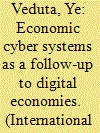

|
|
|
|
|
| Summary/Abstract |
TODAY'S GLOBAL CRISIS, which manifests itself in increasing chaos, has given rise to problems that civilization has never had before. The habitual method of global use of armed force cannot solve any of them. Russian President Vladimir Putin has said in a speech at a session of the UN General Assembly in New York that exporting social experiments has tragic consequences and can have degrading effects on societies. He argued that a digital economy is essential as an instrument for tackling global tasks. A digital economy sets "a new paradigm for the development of the state, the economy, and society as a whole" and involves the use of information technology (IT) to make governance more efficient.1 There exist two fundamentally different principles for building a digital economy.
|
|
|
|
|
|
|
|
|
|
|
|
|
|
|
|
| 16 |
ID:
176194


|
|
|
|
|
| Summary/Abstract |
The rapid shift to online teaching and learning during the COVID-19 pandemic has accelerated the penetration of an algorithmic world view into education systems around the world. Promoted by a burgeoning educational technology industry, platforms that use algorithms to structure and monitor teaching and learning have been presented as technical solutions to systemic problems. But they have also created new problems and reinforced existing inequities, stirring up public and political backlashes. Beyond its immediate effects during the pandemic in 2020, the expanded use of algorithm-driven learning management systems backed by major corporations has major implications for the future of global education.
|
|
|
|
|
|
|
|
|
|
|
|
|
|
|
|
| 17 |
ID:
176747
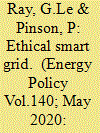

|
|
|
|
|
| Summary/Abstract |
The European Union is implementing ambitious programs to tackle energy efficiency, energy independence, and climate change challenges. To reach the 20/20/20 targets, the EU aims at modernizing power grids to make them ‘smart’ by collecting close to real-time data and subsequently operate grids more optimally. One of the smart grid purposes is to integrate a growing share of renewable generation while efficiently accommodating their variability and limited predictability through the actuation of consumer flexibility. Hence, the success of energy programs relies on customer involvement in altering their energy consumption through the use of analytics and incentive-based demand-side management. The rollout of smart meters throughout Europe should provide the necessary information to implement them. This is without accounting for a possible backlash of customers in response to bad practices of utilities when it comes to digitization and smart meter rollout, also associated with the potential distrust of digital products. Beyond legal binds and technical obstacles, the possible ways of handling the rollout of smart meters and metering, which defines the relationship between customers and utilities, are multiple. However, only the practices that exhibit ethical behavior of the utilities towards customers, and consider them as stakeholders in smart grids will lead to a fruitful and long-lasting relationship between customers and utilities.
|
|
|
|
|
|
|
|
|
|
|
|
|
|
|
|
| 18 |
ID:
166487


|
|
|
|
|
| Summary/Abstract |
Modern grid monitoring equipment enables utilities to collect detailed records of power interruptions. These data are aggregated to compute publicly reported metrics describing high-level characteristics of grid performance. The current work explores the depth of insights that can be gained from public data, and the implications of losing visibility into heterogeneity in grid performance through aggregation. We present an exploratory analysis examining three years of high-resolution power interruption data collected by archiving information posted in real-time on the public-facing website of a utility in the Western United States. We report on the size, frequency and duration of individual power interruptions, and on spatio-temporal variability in aggregate reliability metrics. Our results show that metrics of grid performance can vary spatially and temporally by orders of magnitude, revealing heterogeneity that is not evidenced in publicly reported metrics. We show that limited access to granular information presents a substantive barrier to conducting detailed policy analysis, and discuss how more widespread data access could help to answer questions that remain unanswered in the literature to date. Given open questions about whether grid performance is adequate to support societal needs, we recommend establishing pathways to make high-resolution power interruption data available to support policy research.
|
|
|
|
|
|
|
|
|
|
|
|
|
|
|
|
| 19 |
ID:
158163


|
|
|
|
|
| Summary/Abstract |
The article explores Israeli radio stations’ activity on Facebook and analyses the most popular content in terms of various engagement indexes. It finds that the format of a post, its language and content, all affect the level and nature of user engagement with the post. Moreover, it appears that both stations and users turn to Facebook primarily for promotional and PR purposes and less so for promoting mutual interaction and dialogue between stations and their audiences, thus complementing the traditional medium without utilising the full range of opportunities this new platform has to offer radio.
|
|
|
|
|
|
|
|
|
|
|
|
|
|
|
|
| 20 |
ID:
157740


|
|
|
|
|
| Summary/Abstract |
As digital technologies and algorithmic rationalities have increasingly reconfigured security practices, critical scholars have drawn attention to their performative effects on the temporality of law, notions of rights, and understandings of subjectivity. This article proposes to explore how the ‘other’ is made knowable in massive amounts of data and how the boundary between self and other is drawn algorithmically. It argues that algorithmic security practices and Big Data technologies have transformed self/other relations. Rather than the enemy or the risky abnormal, the ‘other’ is algorithmically produced as anomaly. Although anomaly has often been used interchangeably with abnormality and pathology, a brief genealogical reading of the concept shows that it works as a supplementary term, which reconfigures the dichotomies of normality/abnormality, friend/enemy, and identity/difference. By engaging with key practices of anomaly detection by intelligence and security agencies, the article analyses the materialisation of anomalies as specific spatial ‘dots’, temporal ‘spikes’, and topological ‘nodes’. We argue that anomaly is not simply indicative of more heterogeneous modes of othering in times of Big Data, but represents a mutation in the logics of security that challenge our extant analytical and critical vocabularies.
|
|
|
|
|
|
|
|
|
|
|
|
|
|
|
|
|
|
|
|
|